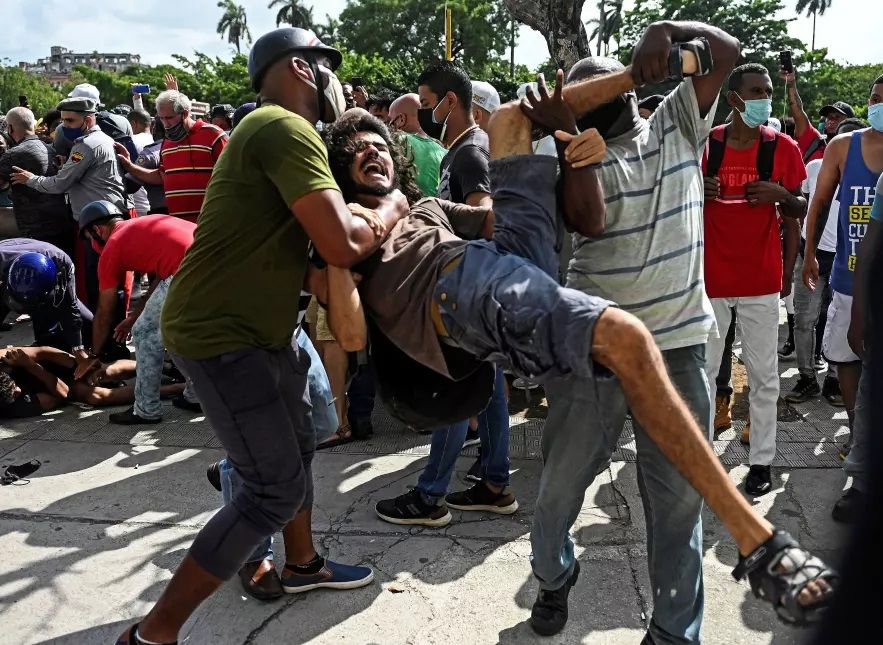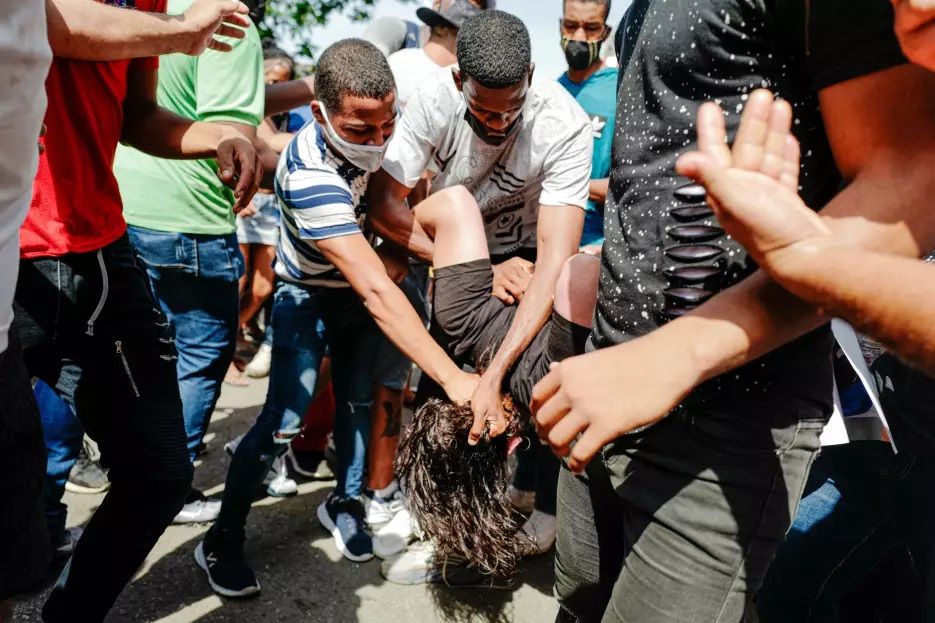For the visit last January 10, Ailex Marcano carried coffee, toast, and a soda. Ángel Jesús, her 29-year-old son, is not very demanding. The previous visit was half an hour on New Year’s Eve. “How sad when they bring him in handcuffs,” says the mother. This last meeting lasted longer, two hours in the office of the Directorate of the Kilo 9 Penitentiary Center in Camagüey, a period during which Ángel Jesús looked at the printed photos of the family, and talked about how much his godchildren have grown, especially the youngest, who was born in the United States and he still has not met. These visits, all of them, always take place under the watchful eye of prison officials.
Although family members of other prisoners are allowed to visit the prison, Ailex and her family are not. “They know that I report everything,” says the mother, who worked as a sports psychologist at the National Institute of Sports, Physical Education and Recreation (INDER). Since the Cuban authorities charged Ángel Jesús, following his participation in the protests that took place in Cuba on July 11, 2021, and sentenced him to six years of imprisonment for the crimes of public disorder and assault, Ailex has denounced the situation of her son and other Cuban political prisoners in every possible space, including at the headquarters of the Office of the High Commissioner for Human Rights in Geneva.

After having explored all possible legal channels to have her son at home, after appearing before the courts, the Prosecutor’s Office, and meeting with high representatives of the Catholic Church and NGOs to denounce the situation of political prisoners, Ailex turns to one of the last resources she has left: amnesty.
On January 19, 2024, Ailex, together with 34 relatives of other political prisoners, prepared and signed a letter addressed to Ana María Mari Machado, Vice President of the National Assembly of People’s Power, so that, as a deputy, she would initiate the process “so that an Amnesty Law be approved per the procedures of the law.”
It was Wilber Aguilera Bravo, father of political prisoner Walniel Luis Aguilar Rivera, sentenced to 12 years in prison for sedition after participating in the protests in the Havana neighborhood of La Güinera, who delivered the letter at the Assembly building.
The document states that Law No. 131/2019 on the Organization and Functioning of the National Assembly of People’s Power and the Council of State of the Republic of Cuba grants deputies the power to propose bills, and citizens the right to submit petitions, “although to this day no deputy has ever done so,” the letter says.
It also makes clear that the amnesty implies the recognition that “there was no crime” in the participation of citizens in the 2021 demonstrations and other collective and individual protests carried out by other political prisoners in a demand for “freedom, human rights, and democracy.”
From 1959 until today, there is no precedent of amnesty in Cuba. In a country that imprisoned more than a thousand people after the July 11 protests, and ended 2023 with 1,251 political detainees, is it possible that the government will grant an amnesty?
“I have faith, the conditions are ripe”
Chapter XX of the Official Gazette states that “amnesty is the act of commutation of the penalty imposed to whoever has committed a crime and entails the forgetting of the offense, the elimination of the criminal action and the forgiveness of the sanction.” It also clarifies that it is the National Assembly of People’s Power that “has the constitutional power to grant amnesties, through a law adopted by ordinary vote.”
In 1998, Pope John Paul II, during his visit to Cuba, asked for the release of prisoners and Fidel Castro released 200 people from the island’s jails. In 2003, the government imprisoned 75 dissident figures in a hunt known as the Black Spring, and those who were later released from prison did so under a non-penal settlement, in negotiation with the Vatican and the government of Spanish President José Luis Rodríguez Zapatero. In 2011, on the eve of Benedict XVI’s visit, the Cuban government released 2,900 prisoners. And in 2015, before the arrival of Pope Francis, three thousand 522 inmates were released: people over 60 years old, under 20 with no criminal record, as well as chronically ill, women and inmates in flexible detention conditions. Political prisoners did not benefit in any of these negotiations, and in all of them, pardons were granted, not amnesty.

“The amnesty and pardon terms are not interchangeable,” explains former Cuban prosecutor Frank Ajete Pidorych. “In both cases, they are signs of benevolence strategically used by the government, but they have two differences that in the Cuban case have a major impact.” According to Ajete, the first of these differences is that the amnesty emanates from the legislative power, and the pardon from the executive power. The second, according to the expert, has to do with penal philosophy.
“Pardons are a sort of pardon of the sentence, which maintains the rest of the consequences, including the criminal record,” he says. “It is a grace aimed at not fulfilling a punishment that continues to be understood criminally, socially, and politically as deserved. Amnesty, on the other hand, not only implies that the punishment is without effect, but also plays with exculpation.”
Cuban jurist Laritza Diversent, director of Cubalex, explains that the request of the families before the vice-president of the Assembly is not, expressly, a request to the National Assembly, but to a deputy, “a personal request so that she in her capacity as deputy, based on the public functions she has, initiates the procedure as established in Law 131.”
However, Diversent does not believe that Mari Machado will support an initiative that favors the relatives of political prisoners. “The possibility of them granting an amnesty is viable, what is unlikely is that the authorities in Cuba will accede to that particular request.”
Ajete also believes that although the release of Cuban political prisoners linked to the July 11-12 demonstrations in Cuba may represent a “sign of goodwill on the part of the Cuban dictatorship,” in the form of an amnesty “it would be dangerous for the dictatorship itself, precisely because it implies a new value judgment on the right to demonstrate, to denounce, to demand.”
Therefore, the former prosecutor believes the most viable option would be a pardon. “A pardon would fulfill two needs. On the one hand, release from prison. On the other, a new value judgment would not be issued, that is, the exercise of demonstration and speech would continue to be interpreted as seditious acts, and also these released prisoners would keep a criminal record for confronting the State, which could nullify them in possible future demonstrations.”
Cardinal Beniamino Stella, Pope Francis’ special envoy, said at the University of Havana in early 2023 that the issue of Cuban political prisoners was “on the table” and mentioned the word “amnesty” during his speech.
“I ask fervently […] that there be a positive response, whatever it is called, amnesty, clemency, whatever it is called,” he said. “Words can also be secondary, but it is important that the young people who at one time expressed their thoughts and did so in the way we know can return to their homes.”
So far, the Cuban government has given no sign of a possible release, but even so the families of the prisoners are confident that something will happen with this new appeal calling for amnesty.
“I have faith, the conditions are ripe and the government is not in its best moment”, assures Ailex Marcano. “The weight of the political prisoners has a transcendental cost at national and international level.”
Niurka Rodríguez, mother of young Yunaikis Linares, also detained during the protests in Havana, says that she “will continue to demand freedom until they are free. As mothers, we never lose hope,” she adds.
Wilber Aguilera himself, after delivering the petition, was hopeful: “Let’s hope that it gets to where it has to go and that our political prisoners are released.”

By what other means could Cuban political prisoners be released?
In addition to amnesty, there are at least seven other legal avenues that the Cuban government could use to free political prisoners. The Cuban Observatory for Human Rights (OCDH) prepared a document that was recently sent by the Inter-American Commission on Human Rights (IACHR) to the Cuban Minister of Foreign Affairs, Bruno Rodríguez, where they presented the methods that exist for the liberation.
According to these organizations, among the legal avenues are also pardon, non-penal settlement, conditional release and substitution of prison for alternative sanctions, release on the grounds of procedural nullity, definitive or free and total dismissal, and withdrawal of accusation.
“All political and legal alternatives must be demanded,” insists Yaxys Cires, OCDH Strategy Director. “We cannot exclude those of greater political significance, such as Amnesty. However, I do not believe that, given the current situation, the relatives will refuse other solutions such as pardon or non-penal settlement.”
In the letter addressed to the vice-president of the Assembly, it is clear that the relatives of the prisoners have demanded their freedom by all possible means, even those that seem remotest.
“In the years to come, it will not be possible to say that Cuban citizens do not demand and fight by all means available for the Amnesty of the unjustly condemned,” the letter says. “If you do not stand on the right side of history in this key hour, you will have to own your silence, complicity, cowardice, and hindrance to the legitimate aspirations for democratic change of the majority of Cubans.”
The petition before the Assembly was signed by Larianny Otero Alcántara, sister of the artist and leader of the San Isidro Movement Luis Manuel Otero Alcántara; by Viviany Peña, wife of rapper Maykel Osorbo; by the mother of Luis Robles, the young man sentenced to five years in prison for demonstrating with a sign demanding freedom in the middle of Obispo Street in Havana, among others. The petition is open and “extends to all persons imprisoned for political reasons in Cuba.”




